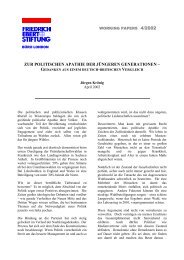Where Now for European Social Democracy? - Policy Network
Where Now for European Social Democracy? - Policy Network
Where Now for European Social Democracy? - Policy Network
Create successful ePaper yourself
Turn your PDF publications into a flip-book with our unique Google optimized e-Paper software.
78WHERE NOW FOR EUROPEAN SOCIAL DEMOCRACY?who pose a greater risk to the community. A good example of this isthe Community Safety Action Zone established in Bexley, where thelocal authority has actively involved the community in tackling crimeand anti-social behaviour. In the first two years of the scheme, not onlyhave levels of crime fallen (in some categories, like street robbery,by up to 85 per cent) – but also and almost as importantly, fear of crimehas fallen dramatically, making a real difference to people’s lives.When previously only 20 per cent of residents said they felt safe afterdark, that has risen to over 90 per cent. This shows us how freedomultimately comes from a virtuous circle of security, communityconfidence, strong civil society, and democratic government.What type of freedom are we trying to achieve?The challenge of citizenshipThis brings me to my second theme. In addressing the issues of liberty,security and justice, it is essential to consider what sort of freedom weare trying to achieve. My belief is that we need to strive <strong>for</strong> freedomin its widest <strong>for</strong>m – not just freedom from interference, but freedom<strong>for</strong> people to engage in providing solutions <strong>for</strong> themselves, theirfamilies and their communities. As the Ancient Greeks would have it,the freedom to contribute to the Polis.Quite simply, I am interested in freedom from external interference,physical protection, the protection of civil liberties, but I am alsointerested in the positive freedom to get involved in <strong>for</strong>mal politics,and, importantly, in the development of civil society. These typesof freedom are, of course, complementary. Participation as activecitizens and engagement in the democratic process are crucial to thevery survival of a pluralistic, civilised, and free society.This is as true in the neighbourhood or county, in the region, ornation state, as it is on the international scene. That is why I havesought to build a commitment to civil society from the neighbourhoodupwards. As Education and Employment Secretary I was engaged indeveloping ‘active citizenship’ programmes. We introduced intoschools the opportunity to learn citizenship and democracy, andlinked that to opportunities to volunteer in the community. Across



